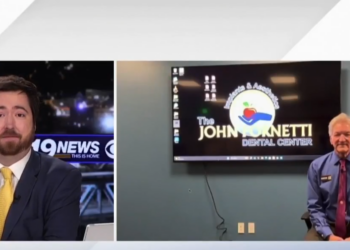LANSING. Mich. (WZMQ) – Michigan’s legislature passed the state budget late Wednesday– the largest in state history– just days before the self-imposed July 1 deadline.
Gov. Gretchen Whitmer said she applauds the passage of what she’s calling the Make it in Michigan budget. The $81.7 billion budget includes a general fund total of $15.2 billion and a School Aid Fund of $19.4 billion.
“The Make it in Michigan budget will build a bright future for our state,” said Governor Whitmer. “It lowers costs on health care, preschool, meals for kids, higher education, housing, and workforce training. It will help us keep fixing the damn bridges, replacing lead pipes, and protecting public safety. And it will power ‘Make it in Michigan,’ our comprehensive vision for economic development so we can win more projects, invest in people, and revitalize places. I am so grateful to the new leadership in the legislature for getting this done. Let’s keep our foot on the accelerator.”
The budget for fiscal year 2024 goes into effect October 1.
Education – Getting Kids Back on Track & Supporting Student Success
K-12 Education
- $611 million to increase per-pupil funding by 5%, an additional $458 per student, for a total of $9,608 per pupil. Per-pupil funding is up 22% since the Governor took office.
- $450 million deposit into a new rainy day fund for schools, setting aside resources for future needs and shoring up the long-term financial stability of the state’s public education system.
- $370 million to support teachers, including continued support for the MI Future Educator Program (which provides a tuition free path for college students to become certified teachers) and funds to retain and develop existing teachers through mentorship programs.
- $328 million for mental health and school safety.
- $254.6 million to expand free pre-K for up to 5,600 kids, working towards Pre-K for All by the end of the Governor’s second term, saving families $10,000 a year and putting kids on the path to a brighter future.
- $204.5 million increase, for a total of $952 million, in funding for academically at-risk, economically disadvantaged students.
- $160 million to provide all 1.4 million public school students in free breakfast and lunch, saving their families over $850 a year and time every morning.
- $150 million for individualized tutoring or academic support through the MI Kids Back on Track program.
- $140.3 million to continue expanded support for special education students, providing a full foundation allowance plus required cost reimbursements for each student.
- $125 million to fund matching grants for school districts to modernize their bus fleet by switching over to electric vehicles.
- $94.4 million for literacy-related programs and activities in Detroit public schools.
- $25.5 million to help students reach their full academic potential, including expansion of existing payments for literacy grants and literacy coaches.
- $25 million supporting new math intervention programs.
- $25 million for additional supports for vocational education and career and technical education equipment upgrades.
- $13.3 million to provide a 50% increase in funding for English language learners.
- $8 million over two years to establish the Nature Awaits program, providing every Michigan fourth grader with a free field trip to a state park.
“This is another outstanding budget, one that again works hard on funding adequacy and equity,” said State Superintendent Dr. Michael Rice. “In addition to a 5 percent foundation allowance increase, big percentage increases for the education of students with disabilities and English learners, and additional funding earmarked for staff compensation, the budget funds greater flexibility and continued expansion of the Great Start Readiness Program (GSRP) program toward universally accessible pre-school, the implementation of the governor’s MI Kids Back on Track tutoring program for children who are behind in reading or math, universal school meals for students, and an opportunity index to fund high percentages of economically disadvantaged students. The budget also funds mentoring for new teachers, new counselors, and new administrators, as well as training for school board members, and transportation reimbursement to help address the cost of transportation, especially for rural districts whose per-rider costs are high. In the 30 years since Proposal A to change the school funding system, Michigan hasn’t had two years of back-to-back funding increases close to FY23 and FY24. Kudos to the governor and state legislature for their work, among that of many others, on the budget front.”
Higher Education & Workforce Development
- A 5% ongoing increase for university and community college operations.
- $112 million in Infrastructure, Technology, Equipment Maintenance, and Safety (ITEMS) funding to assist community colleges and universities improve existing facilities, infrastructure, technology, and campus security.
- $70 million to temporarily lower the eligibility age for Reconnect from 25 to 21, making a tuition-free associate degree or skills training available to 350,000 more Michiganders.
- $50 million additional investment for the ongoing costs of the Michigan Achievement Scholarship, lowering costs by thousands for students, bringing the FY24 investment to $300 million.
- $37.8 million for the College Success Fund and wraparound services to improve retention and completion rates.
Public Health – Strengthening Families
- $140 million to increase wages for direct care workers and other staff assisting those with disabilities and seniors who require home-based and nursing home services and supports.
- $156.8 million to increase reimbursement rates for Medicaid services to improve enrollee access to necessary health care.
- $49.5 million to implement recommendations from the Racial Disparities Task Force, including neighborhood health grants, mobile health units, sickle cell support and more.
- $56.4 million to fund Healthy Moms, Healthy babies, a bipartisan initiative that supports pregnant women, new mothers, and infants.
- $25 million increase in support to local health departments to provide essential services.
- $10 million to create a new foster care respite care program to provide temporary, occasional relief to foster parents.
- $6.2 million to fund the Medicaid Plan First! Program, expanding access to family planning services and cancer screening and saving 25,000 Michiganders an average of $2,000.
- $4.9 million over 2 years for Double-Up Food Bucks, boosting access to fresh fruits and vegetables for Michiganders on food assistance.
Public Safety – Keeping Communities Safe
- $171.5 million in public safety grants, benefitting communities across the state.
- $34.2 million to enact various recommendations from the Task Force on Juvenile Justice Reform, including creating a Juvenile Justice Services Division within the State Court Administrative Office and expanding the scope of the Office of the Children’s Advocate.
- $30 million for cameras to keep drivers on Detroit freeways safe.
- $18.2 million to provide in-service training to licensed law enforcement officers.
- $14.4 million to improve safety and accountability in correctional facilities, including $7 million to outfit corrections officers with body cameras.
- $10 million toward leveraging the State Police Training Academy to serve as a criminal justice training hub to support realistic, multi-disciplinary training opportunities for law enforcement agencies across the state.
- $10 million for the Selfridge Air National Guard Base to improve and maintain infrastructure at the base to continue to position Michigan to compete for next generation aircraft and future fighter missions.
- $10.5 million in new statutory revenue sharing (2% one-time) dedicated specifically for public safety, including employee recruitment, retention, training, and equipment for first responders.
- $9 million to run a Michigan State Police Trooper Recruit School, graduating an anticipated 50 new recruits.
- $6.8 million to establish the Office of Community Violence Intervention Services to partner with community-based organizations already working to reduce violent incidents.
- $5 million to expand the Jobs Court, a program that aims to reduce recidivism by providing jobs and services to disadvantaged offenders.
- $5 million to expand national guard tuition assistance program, expanding educational opportunities for service members and their families and moving Michigan closer to the Sixty by 30 Goal.
- $2.9 million to implement gun violence prevention policies.
- $2 million for veteran homelessness grants, helping veterans access affordable housing and avoid homelessness.
- $1.2 million for veteran suicide prevention efforts, improving the health and well-being of Michigan’s more than 550,000 military veterans and their families.
- $500,000 for PACT Act VA claims assistance, connecting veterans with VA benefits related to toxic exposure to burn pits, Agent Orange, and other substances.
Rebuilding Infrastructure
Roads, Bridges, Transit, Electrification
- $416 million to fix the damn roads and build up all kinds of public infrastructure, improving quality of life.
- $80 million investment supporting Michigan’s Bridge Bundling program to replace or rehabilitate more than 20 structurally deficient bridges across the state.
- $50 million for Intermodal Capital Investment Grants to support investments in rail, marine, intercity, and local transit infrastructure that have the potential to leverage federal funding opportunities.
- $21.3 million for clean energy and electric vehicle infrastructure investments.
- $17.8 million for the Information Technology and Investment Fund for modernization of legacy IT systems supporting local income tax collections for those communities that elect to participate, environmental permitting and inspection, groundwater protection, occupational safety and health, and talent recruitment and retention.
- $1 million to begin the transition of the State of Michigan’s fleet to electric vehicles.
- $6.6 million to improve permitting processes and reduce permit issuance wait times.
- $5 million for a critical mineral recycling research hub.
“Michigan Technological University is excited to partner with the state for the critical mineral recycling research hub,” said David Reed, VP of Research at Michigan Tech University. “The state’s investment in this critical research further demonstrates Michigan’s commitment to advance our state’s role in innovation and leadership in the future of mobility and electrification. The students, research faculty, and staff at MTU are eager to expand our industry partnerships and research capabilities in this emerging and critically important area.”
Housing
- $212 million for residential energy efficiency improvements through federal funds, lowering costs for Michiganders via point-of-sale rebates for home appliances, water heaters and more.
- $50 million for the Housing and Community Development Program to alleviate affordable housing needs across the state and revitalization downtown areas in Michigan.
- $10 million for Missing Middle housing programs to build on existing $50 million within the current year budget.
- $2 million to expand capacity of the State Land Bank Authority, which facilitates productive reuse of land in our communities.
Water, Parks, Agriculture, Environment
- Nearly $600 million for Michigan’s water infrastructure, protecting access to drinking water, replacing lead service lines, rebuild sewers, and more.
- $150 million to reopen the Palisades nuclear power plant, securing good-paying jobs.
- $23 million for improvements at Belle Isle State Park
- $23 million to create an endowment for the new Flint State Park
- $20 million to establish an environmental justice contaminated site clean-up fund to remediate and redevelop contaminated sites in historically disadvantaged and underrepresented communities.
- $13 million for agricultural climate resiliency and soil health to research new regenerative agriculture practices and help farmers reduce run off and increase crop diversity.
- $10.1 million for Resilient Food Systems Infrastructure Program, using federal funds to boost resiliency in Michigan’s food systems.
- $7.7 million in state parks operations funding to provide additional park rangers and provide essential resources to state parks.
- $5.5 million for Michigan Saves to incentivize private investment in clean energy improvements for Michigan residents and businesses.
Economic Development
- $500 million annual deposit in the Make it in Michigan Fund, also known as the bipartisan Strategic Outreach and Attraction Reserve (SOAR) Fund.
- $350 million for the Make it in Michigan Competitiveness Fund to win federal resources from the Bipartisan Infrastructure Law, the CHIPS and Science Act, and the Inflation Reduction Act.
- Michigan is set to receive over $1.5 billion (4th highest in the nation) through the Broadband Equity, Access, and Deployment (BEAD) Program to expand high-speed internet access to over 200,000 Michiganders in unserved and underserved areas across the state.
- $15 million for talent action teams to fast-track assistance to businesses looking to expand or locate in Michigan.
- $10 million to promote Michigan as a destination for special events and national conventions, plus an additional $10 million in convention and visitor bureau grants.
- $5 million for the Michigan Defense Center to protect and grow the defense and homeland security industry in Michigan.
The budget deposits $200 million into the Budget Stabilization Fund, or ‘rainy day fund,’ bringing the balance to nearly $2 billion by the end of FY24, an all-time high. The budget also invests $450 million in a new rainy day fund for the School Aid Fund to protect our students from unforeseen future economic conditions.
Additionally, $26.7 million is included to provide a 5% increase (4% ongoing and another 1% ongoing to communities that obligate all available ARP) in statutory revenue sharing to help counties, cities, villages, and townships; and new dedicated statutory revenue sharing funds, 2% one-time, for public safety initiatives; plus, an additional $64 million over current year funding in constitutional revenue sharing payments.






